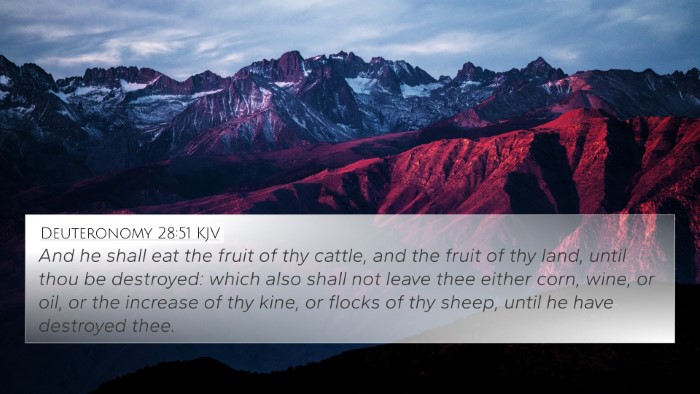Understanding Judges 6:3
Judges 6:3 states: "And it was so, when Israel had sown, that the Midianites came up, and the Amalekites, and the children of the east, even they came up against them."
This verse takes place in a critical moment during Israel’s history when they faced oppression from neighboring nations. Understanding its implications can be greatly enhanced through comparative Bible verse analysis and inter-Biblical dialogue.
Contextual Background
The backdrop of this verse is essential for interpreting its meaning. Israel had fallen into a cycle of sin, which led to oppression by the Midianites and other groups.
-
Historical Context:
The Midianites, having been dominant in the region during this time, exemplified a recurrent theme in Judges, where Israel faces consequences for turning away from God. This reflects God's justice and the covenant relationship He maintained with His people.
-
Thematic Elements:
The themes of sowing and reaping are prevalent, indicating that Israel's actions had direct consequences. This can also be linked to Galatians 6:7, reminding us of the broader Biblical principle of divine retribution, where every action has a corresponding reaction.
Interpretation and Insights
The arrival of the Midianites signifies not just a physical threat but also a spiritual one. According to Matthew Henry’s commentary, this passage reflects Israel's plight and God’s purpose in allowing such hardships as a means to call His people back to repentance.
-
Meaning of 'Sowing':
The act of sowing can be seen allegorically, as representing the efforts and labor of the Israelites that were thwarted by their enemies—drawing parallels with Ecclesiastes 11:6 about the uncertainty of one’s work.
-
Nature of the Adversaries:
The inclusion of the Amalekites and "children of the east" showcases a coalition against Israel, a motif in the Old Testament that highlights the constant external threats faced by God’s people.
Adam Clarke emphasizes the need for vigilance and faithfulness, as the attack occurs precisely when the crops are ready. This symbolizes that challenges can arise during times of success, paralleling Peter's exhortation to be sober and vigilant in 1 Peter 5:8.
Cross-References
This verse can be cross-referenced with numerous scriptures that amplify its themes:
- Judges 6:1: Illustrates Israel's cycle of sin and consequent oppression.
- Judges 7:12: Provides insights into the Midianites' overwhelming numbers.
- Numbers 21:1-3: Discusses Israel’s battle with the Amalekites, giving historical context.
- Galatians 6:7: Connects the notions of sin and consequences, accentuating the principle of reaping what is sown.
- 1 Peter 5:8: Warns believers to remain vigilant against spiritual adversaries.
- Romans 12:19: Highlights divine justice, mirroring the need for God's judgment upon oppressors.
- Hebrews 12:1-2: Encourages believers to lay aside distractions and look unto Jesus, relevant to the theme of spiritual vigilance.
Conclusion
Judges 6:3 serves as a poignant reminder of the cyclical nature of sin and redemption, the importance of vigilance, and the profound truth that God allows trials to bring His people back into alignment with His will. The study of this passage through tools for Bible cross-referencing can enrich one's understanding of the Scriptures.
For readers exploring how to find cross-references in the Bible, this verse exemplifies the interconnectedness of Biblical narratives and the importance of examining themes across the text.
Utilizing a Bible concordance or cross-reference Bible study can lead to deeper insights and thematic connections, such as the relationship between Israel's sowing and the spiritual principles discussed throughout both the Old and New Testaments.















